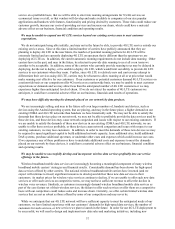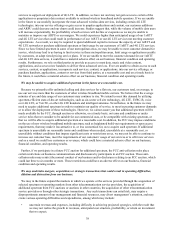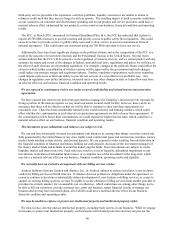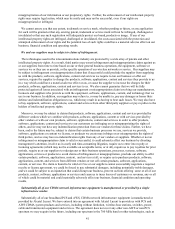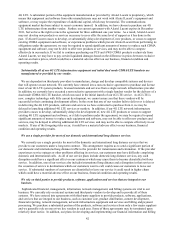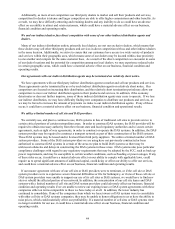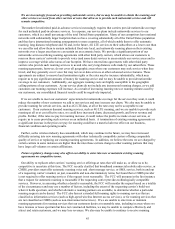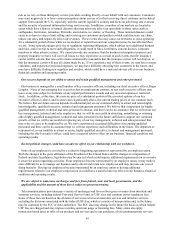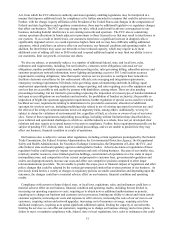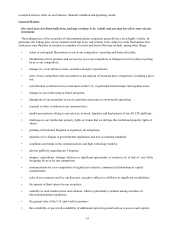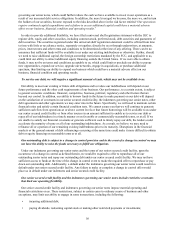Metro PCS 2010 Annual Report Download - page 57
Download and view the complete annual report
Please find page 57 of the 2010 Metro PCS annual report below. You can navigate through the pages in the report by either clicking on the pages listed below, or by using the keyword search tool below to find specific information within the annual report. 47
risk as we rely on these third-party service providers working directly on our behalf with our customers. Customers
may react negatively to or have certain perceptions about our use of or their receiving direct customer and technical
support from outside the U.S., especially with the current legislative scrutiny and focus on jobs being sent overseas
and the security of personal information being sent overseas. In addition, a number of our markets are located in
states which have a history of natural disasters that may adversely affect our operations in those states such as
earthquakes, hurricanes, tornadoes, blizzards, snowstorms, ice storms, or flooding. These national disasters could
cause us to have to stop or limit selling and servicing our customers and products,which could increase our churn,
reduce our sales, and negatively affect our revenues. These events also may cause our networks to cease operating
for a substantial period of time while we reconstruct or repair them and our competitors may be less affected than
we are. Some network outages give rise to regulatory reporting obligations, which subject us to additional burdens
and risks, and if we fail to meet such obligations, it could result in fines, forfeitures, consent decrees, corporate
monitors or other adverse actions. We cannot provide any assurance that the business interruption insurance and
property insurance we have will cover all losses we may experience as a result of such events, that the insurance
carrier will be solvent, that rates will remain commercially reasonable that the insurance carrier will not drop us, or
that the insurance carrier will pay all claims made by us. If we experience any of these events, we may lose revenue,
customers, and experience increased expenses, we may have difficulty attracting new customers in the future, and
may have difficulty finding new suppliers and vendors, which could have a material adverse effect on our business,
financial condition and operating results.
Our success depends on our ability to attract and retain qualified management and other personnel.
Our business is managed by a small number of key executive officers, including our chief executive officer, Roger
Linquist. None of our managing key executives has an employment contract, so any such executive officers may
leave at any time subject to forfeiture of any unpaid performance awards and any unvested options or restricted
stock. In addition, at this time, the exercise price of a substantial portion of the unvested options of our key
executive officers is above, and in some cases significantly above, the current trading prices of our common stock.
We believe that our future success depends in substantial part on our continued ability to attract and retain highly
knowledgeable, qualified executive, technical and management personnel. We believe that competition for highly
qualified management, technical and sales personnel is intense, and there can be no assurance that we will retain our
key management, technical and sales employees, that we will be successful in attracting, assimilating or retaining
other highly qualified management, technical and sales personnel in the future sufficient to support our continued
growth, or that we will be successful in replacing any of our key management, technical and sales personnel that
may retire or cease to be employed by us. We have experienced occasional difficulties in recruiting qualified
personnel and there can be no assurance that we will not experience such difficulties in the future. The departure or
retirement of, or our inability to attract or retain, highly qualified executive, technical and management personnel,
including the chief executive officer, could have a material adverse effect on our business, financial condition and
operating results.
Recent political changes could have an adverse effect on our relationship with our workforce.
None of our employees is covered by a collective bargaining agreement or represented by an employee union.
With the changes in the party affiliation of the President of the United States and the changes in composition of
Federal and state legislatures, legislation may be enacted which could impose additional requirements on us or make
it easier for union organizing activities. If our employees become represented by an employee union, it may make it
more difficult for us to manage our business and to attract and retain new employees and may increase our cost of
doing business. Having our employees become represented by an employee union or having additional
requirements related to our employees imposed on us could have a material adverse effect on our business, financial
condition and operating results.
We are subject to numerous surcharges and fees from federal, state and local governments, and the
applicability and the amount of these fees is subject to great uncertainty.
Telecommunications providers pay a variety of surcharges and fees on their gross revenues from interstate and
intrastate services, including federal Universal Service Fund, or USF, fees and common carrier regulatory fees.
Some of these fees are based on the division of our services between interstate services and intrastate services,
including the divisions associated with the federal USF fees, which is a matter of interpretation and, in the future,
may be contested by the FCC or state authorities. The FCC also may change in the future the basis on which federal
USF fees are charged and may impose recurring spectrum usage or licensing fees. Many states also apply
transaction-based taxes to sales of our products and services and to our purchases of telecommunications services


